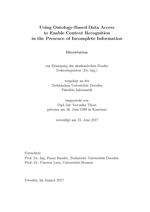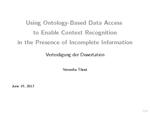Using Ontology-Based Data Access to Enable Context Recognition in the Presence of Incomplete Information
Aus International Center for Computational Logic
Using Ontology-Based Data Access to Enable Context Recognition in the Presence of Incomplete Information
Veronika ThostVeronika Thost
Veronika Thost
Using Ontology-Based Data Access to Enable Context Recognition in the Presence of Incomplete Information
Phd thesis, TU Dresden, 2017/06/19
Using Ontology-Based Data Access to Enable Context Recognition in the Presence of Incomplete Information
Phd thesis, TU Dresden, 2017/06/19
- KurzfassungAbstract
Ontology-based data access (OBDA) augments classical query answering in databases by including domain knowledge provided by an ontology. An ontology captures the terminology of an application domain and describes domain knowledge in a machine-processable way. Formal ontology languages additionally provide semantics to these specifications. Systems for OBDA thus may apply logical reasoning to answer queries; they use the ontological knowledge to infer new information, which is only implicitly given in the data. Moreover, they usually employ the open-world assumption, which means that knowledge not stated explicitly in the data or inferred is neither assumed to be true nor false. Classical OBDA regards the knowledge however only w.r.t. a single moment, which means that information about time is not used for reasoning and hence lost; in particular, the queries generally cannot express temporal aspects. We investigate temporal query languages that allow to access temporal data through classical ontologies. In particular, we study the computational complexity of temporal query answering regarding ontologies written in lightweight description logics, which are known to allow for efficient reasoning in the atemporal setting and are successfully applied in practice. Furthermore, we present a so-called rewritability result for ontology-based temporal query answering, which suggests ways for implementation. Our results may thus guide the choice of a query language for temporal OBDA in data-intensive applications that require fast processing, such as context recognition. - Projekt:Project: Cfaed, HAEC, HAEC B02, HAEC B08
- Forschungsgruppe:Research Group: AutomatentheorieAutomata Theory, Wissensbasierte SystemeKnowledge-Based Systems
@phdthesis{T2017,
author = {Veronika Thost},
title = {Using Ontology-Based Data Access to Enable Context Recognition in
the Presence of Incomplete Information},
school = {TU Dresden},
year = {2017}
}

